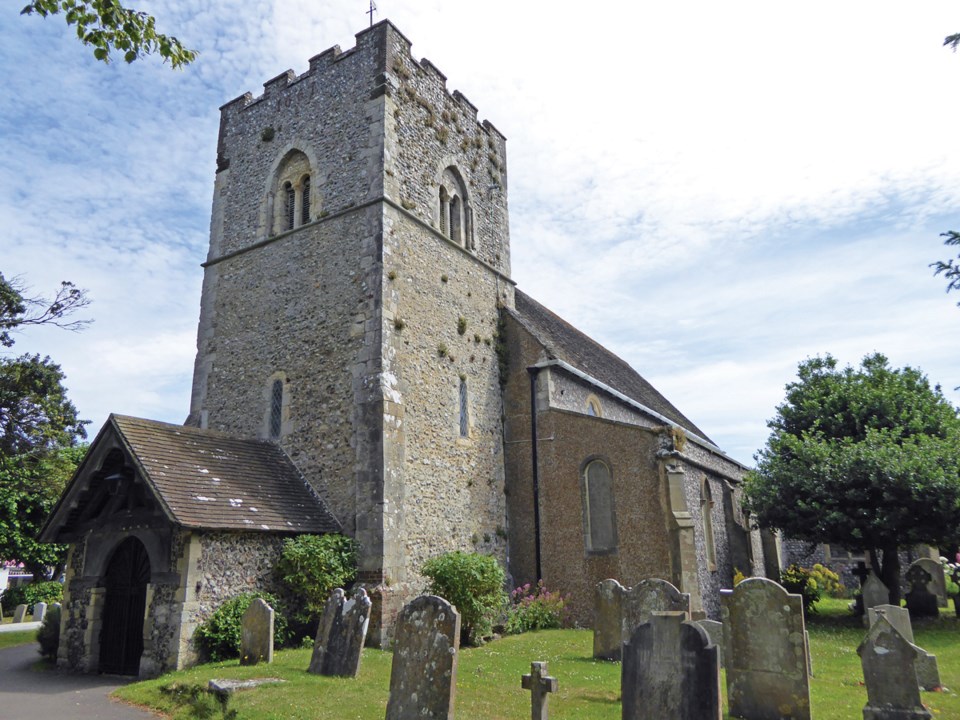A London train takes us to England’s south coast to visit relatives in Rustington, a small seaside village. At 19th century Angmering station, cousin Sue meets us and drives to our guesthouse. Bright and comfy, the Kenmore proves ideally located for daily walks to Uncle Cliff’s, rambling nearby beaches and explorations around town.
Shortcuts through shaded Sussex Park Estate wind us along ‘local traffic only’ streets. Tudor-style homes, some with thatched roofs, mingle with modern designs. Varying our routes, we skirt groomed lawns and flowerbeds exploding with hollyhocks, hydrangeas, daisies and fuchsias. English roses perfume the summer air. In every neighbourhood, we encounter friendly gardeners, cyclists, fellow walkers and their dogs.
Whiling away sunny afternoons with Sue and Cliff, we chat and play croquet in the back garden. Jolly family conversations continue during tasty English-style suppers. For decades, Rustington provided this restful seaside retreat for my uncle and aunt. Buying their cottage after retirement, they’d escaped hectic city life and found this enjoyable, easygoing enclave.
Following hearty full English breakfasts, one morning we investigate the town’s square-towered 12th century Saint Peter and Paul Church. Just across the street, we visit the Museum and Garden Cafe. After viewing old photos and exhibits, enthusiastic volunteers share Rustington stories.
“Our village began as a Stone Age farming settlement,” smiles one gal. “Following the 1066 Norman Conquest, Rustington even got a mention in the Doomsday Book,” beams another. “We’re cited as part of lands William the Conqueror gave to Roger de Montgomery, first in a long list of Lords of the Manor. The Museum itself represents a flint-stone cottage of that era.”
“During the 18th century, our village boasted two public houses: Lamb Inn and New Inn,” chuckles an elderly gent. “A gang of smugglers called Ragman Tots met at New Inn on station road. Their name came from rags muffling squeaky cartwheels in the dark of night.”
We also learn that Rustington’s first shop opened about 1850, the first school in 1859. Farming gradually changed with mechanization. When the last lord died in 1868, his extensive lands were sold.
Among many others, celebrities also sought out Rustington’s peaceful way of life. The most notable, Sir Hubert Parry, composed Jerusalem, Britain’s most beloved anthem. Building Knightscroft House on Sea Lane, he lived in his redbrick mansion 40 years. Scottish writer J. M. Barrie of Peter Pan fame often stayed at Cudlow House with family friends. Blue plaques now highlight such village history.
Not surprisingly, housing and a delightful mix of independent shops and stores boomed in the 1960s. One bookstore offers British children’s classics, Turners Pie Shop provides savoury potpies of every description, and a produce stand sells us baskets of local strawberries.
Twice we ramble the shingle beach paralleling my Uncle’s neighbourhood. Breathing fresh salt air, we pass brightly painted change-huts and tramp the shoreline collecting flint shards and examining white cuttlebones.
Five kilometres away sits picturesque Little Hampton, better-known as Brighton’s “little sis.” When the tide’s out, miles of sand lie beyond Little Hampton’s popular pebble and shell beach. Along its beautiful seafront promenade, Britain’s Longest Bench twists, turns and dips for 324 metres. Recycled hardwood slats offer us unique rollercoaster seating.
Sitting later on humbler seats with newspaper-wrapped takeaways from Fred’s Fish Shop, we slather and enjoy haddock and chips with malt vinegar. Above, watchful gulls swoop and mewl in cloudless skies.
Five days later, another train clickety-clacks us back to London. We visualize Uncle Cliff strumming his ukulele while belting out 1909’s music hall hit: “Oh, I do like to be beside the seaside…oh; I do like to be beside the sea!”
We do too!
If you plan to take a trip to the English seaside, consider a BritRail Pass. Best to check schedules and buy in Canada from ACP Rail International: www.acprail.com



